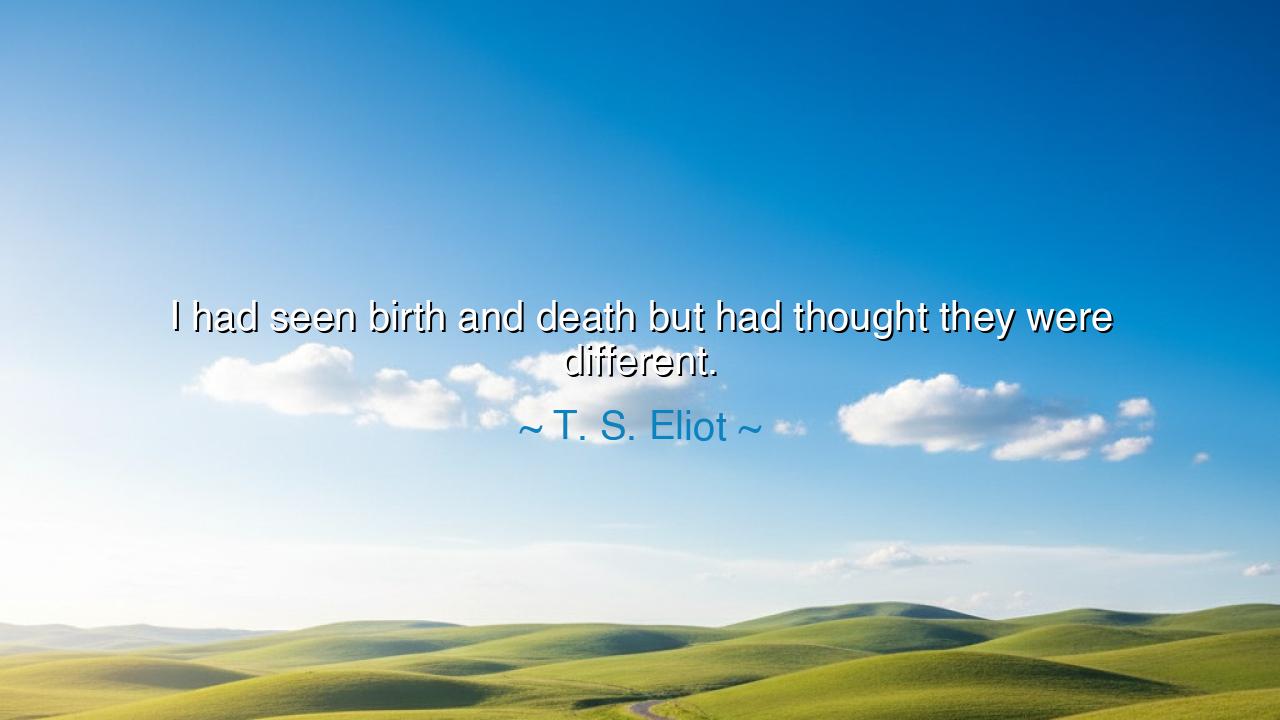
I had seen birth and death but had thought they were different.






“I had seen birth and death but had thought they were different.” Thus wrote T. S. Eliot, the poet-philosopher whose words seem carved from eternity itself. In this single line, he pierces the veil between two of life’s greatest mysteries—birth and death—and declares that they are not opposites, but reflections of one another. His voice is not that of despair, but of revelation. For in this paradox lies a profound truth: that the beginnings and endings we so carefully separate are, in essence, one continuous motion—the rising and falling of the same eternal tide.
Eliot, the author of Four Quartets and The Waste Land, lived in an age that wrestled with meaning amid ruin. War had shattered nations; faith and reason seemed at war within the human heart. Out of this spiritual desolation, he sought to understand the cycle of existence, the quiet law that governs all things. When he wrote that birth and death are not truly different, he was echoing the wisdom of the ancients—the idea that life and death are two faces of one divine process, that every ending is the seed of a new beginning.
The ancients, too, knew this truth well. The Stoics taught that all things arise and pass away according to nature’s rhythm, and that wisdom lies in acceptance. The Buddhists spoke of samsara, the endless cycle of birth, death, and rebirth, from which enlightenment frees the soul. And in the Christian mysticism that shaped Eliot’s later years, death is not annihilation but passage—a return to the eternal source. Thus, when he says he once thought birth and death were different, he speaks for the soul of humanity: for we all, in our ignorance, mistake change for destruction, and forget that the end and the beginning are always intertwined.
Consider the story of Joan of Arc, whose brief life burned with divine fire. When she faced death at the stake, she declared that her soul would soon be in the hands of God, unafraid of the flames. Her body perished, but her spirit gave birth to courage in the hearts of generations that followed. From her death came the birth of an ideal; from her ashes rose a nation’s faith. So it is in all things—what we call death is but a transformation, a gateway through which life renews itself. The tree that falls becomes the soil that nourishes new growth; the setting sun prepares the dawn.
Eliot’s insight is not only metaphysical—it is personal and moral. To live wisely, we must understand that every moment contains both death and birth. The death of innocence gives birth to wisdom; the death of pride gives birth to compassion. Every change we resist, every loss we mourn, is life shedding its skin so that the soul may grow. To see birth and death as one is to free oneself from fear and despair. For the one who understands this truth walks with calm through joy and sorrow alike, knowing that both are woven from the same thread.
The meaning of Eliot’s words, then, is not merely poetic—it is a call to awakening. He invites us to see that life’s apparent contradictions are illusions, and that all things move toward unity. The child born today will one day die, but in dying, he returns to the same mystery from which he came. Birth is not creation from nothing, nor is death a fall into nothingness; both are transformations in the infinite dance of being. To recognize this is to touch the divine order that flows beneath all appearances, to stand at peace amid the ceaseless turning of time.
The lesson, my listener, is this: do not fear change, nor cling to what must pass. Every birth carries the memory of death, and every death conceals a new birth waiting to unfold. When life ends, it does not vanish; it becomes something greater, subtler, unseen. Let this truth humble you, and let it comfort you. Love deeply, knowing that all you cherish is transient—and in that transience, sacred.
So remember Eliot’s words as both wisdom and warning: “I had seen birth and death but had thought they were different.” They are not. They are two sides of the same flame, two breaths in the same eternal rhythm. To live well is to embrace both—to greet beginnings with gratitude and endings with grace. Then, when your own final hour comes, you will not shrink from it, for you will have already understood: in dying, as in living, you are merely being born again into the infinite.






AAdministratorAdministrator
Welcome, honored guests. Please leave a comment, we will respond soon